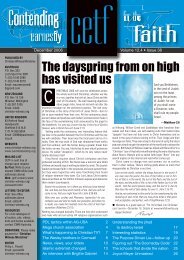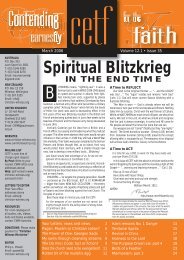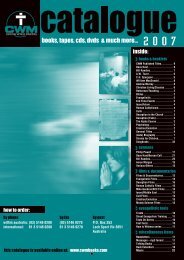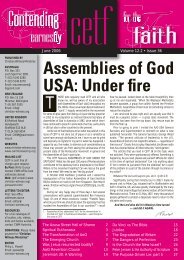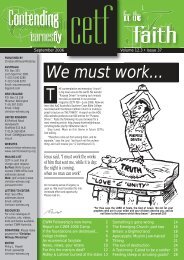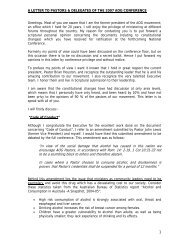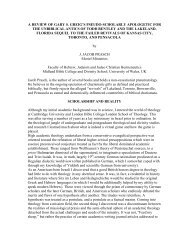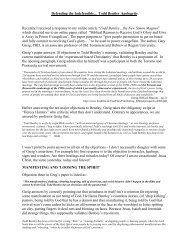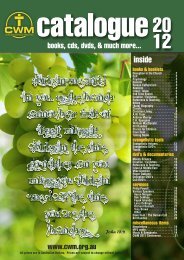PDF here... - Christian-witness.org
PDF here... - Christian-witness.org
PDF here... - Christian-witness.org
- No tags were found...
Create successful ePaper yourself
Turn your PDF publications into a flip-book with our unique Google optimized e-Paper software.
O L O R D , R E V I V E Y O U R W O R K A N D I N W R A T H R E M E M B E R M E R C Y • H a b a k k u k 3 : 2What was it that Wesley brought to Cornwall thatprecipitated such a great change which was feltnot only in Cornwall but throughout the BritishIsles? The answer can be found in one word— revival! And it was such a revival that no-onewas left insensible to its effects, even those withno particular religious interest cannot deny thestupendous changes for good that were wroughtin British society as the revival took hold and Jesusbecame known as Lord throughout the land.The Wesley brothers were men who had amessage that burned in their souls with such holypassion that they could not help but proclaim itto all and sundry. That passion was born from thedeep conviction that the gospel is the power of Godto salvation and that through the preaching of thegospel men and women would meet the Saviour andfind all their needs met in Him. It is such passionand conviction that is desperately needed amongstthe Lord’s people today.28APPENDIXDuring times of persecution in Cornwall, God raisedup “exhorters” who held the societies together,some of these men became part of “Wesley’s army”of itinerant preachers and are worthy of note as theyillustrate something of the influence and fruitfulnessof John and Charles Wesley’s ministries. We shallbriefly look at just three of these:PETER JACO: Born in Newlyn in 1729 Peter Jacowas the son of a pilchard processor. After leavingschool at the age of 14 he joined his father inemployment. From a young age Peter had “awfulthoughts of God” which kept him from youthfulexcesses. He was aware of his sinfulness but didnot know what to do about it. In 1746 he heardhis first Methodist preacher and was soon afterconverted through the preaching of a local tinner.He later became an exhorter and when JohnWesley visited in 1751 he appointed Peter overseveral societies. In 1754 Wesley called him toLondon and at Conference he was appointed tothe Manchester circuit. He faced many difficulties.Once in Warrington he was struck so hard on thechest by a brick that the blood gushed out throughhis mouth, nose and ears. He often preached threeof four times a day, riding 30 or 40 miles with verylittle of the basic necessities of life. He died in 1781aged 52 after several years of ill health.JOHN MURLIN: Born at St Stephen in 1722 hewas a farmer and a carpenter, and by his ownadmission an “enemy to God and his own soul”.He swore, gambled and drank heavily. He hearda Methodist preacher in February 1749 and cameunder conviction of sin. In April he found release forhis soul after a long struggle. Soon he was askedto lead a small class and later became a reluctantpreacher and was amazed to find God using him tobring blessing. Following this John Wesley askedhim to be a travelling preacher at first sending himto west Cornwall. Later he would labour in Ireland,Bristol, London and Manchester. In his latter dayshe was afflicted by painful rheumatism so thathe could barely walk. He had a stroke which lefthim completely immobilised, but he continued tomaintain his happiness in the love of God. He diedin 1799 and was buried in the same vault as JohnWesley at City Road Chapel.RICHARD RODDA: Born in 1743 at Sancreed hisparents were “God-fearers” who initially wantednothing to do with the Methodists. Howeverhis eldest sister was converted, followed by hismother. From a very early age (4-6) he developedan awareness of God and sin. In 1756 he cameunder strong conviction of sin and after seekingrest for his soul for two years, he found peace withGod on the 11th June 1758 upon which he wrotea hymn, “Praise God, my soul, whose wondrouslove hath drawn thy thoughts to things above.”Richard worked in the mines and testified to manymiraculous escapes wrought by God’s hand. Hebecame a local preacher, often preaching threetimes on a Sunday, travelling many miles on foot. Hemet John Wesley while on a business trip to Walesand offered his service to the Glam<strong>org</strong>an circuit. Helaboured as an itinerant preacher for 33 years andended his days in London on October 30th 1815 aged72. Like most of the early Methodist preachers hefaced trials and persecutions which he overcamefearlessly and was never deterred from his call tobe an itinerant preacher.BIBLIOGRAPHY:C. Wesley Journal; Vols. 1, 2J. Wesley Works; Vols. 1, 2, 6J. Wesley Journal; Vols. 7, 8J. S. Simon J. Wesley and the Methodist SocietiesJ. S. Simon J. Wesley and the Advance of MethodismJ. S. Simon J. Wesley and the Last AdvanceJ. S. Simon The Last PhaseF. G. Gill In the Steps of John WesleyClaude Berry CornwallPeggy Pollard CornwallThomas Jackson(ed) Lives of Early Methodist Preachers;Vols. 1,2,3Rev. L. Tyerman The Life and Times of WesleyAbout the AuthorPAUL SHERBIRD lives in Truro,Cornwall England with his wifeJulie. He pastors a small housefellowship (Truro <strong>Christian</strong> Fellowship)which commencedjust over a year ago (2005). Themain reason for the formationof the fellowship was that they could not findan “uncompromised” church in the area andthey very much felt led of the Lord to start awork. Paul was saved in 1988, aged 30 aftermany years of involvement in the drug cultureand on the fringes of the occult. In 1992 heentered the Emmanuel Bible College w<strong>here</strong>he graduated four years later with a Bachelorof Theology degree. Since then he has servedin various church leadership positions (elder;assistant pastor, lay minister) until January2005. He describes his main ministry as teachingwith a strong desire to know and teachsound doctrine.● For more visit the “About” sectionof his website: www.spreadthetruth.co.ukVALEToday we mourn the passing of a belovedold friend, Common Sense, who has beenwith us for many years. No one knows forsure how old he was, since his birth recordswere long ago lost in bureaucratic red tape.He will be remembered as having cultivatedsuch valuable lessons as: Knowing when tocome in out of the rain; Why the early birdgets the worm; Life isn’t always fair; andMaybe it was my fault.Common Sense lived by simple, soundfinancial policies (don’t spend more thanyou earn) and reliable strategies (adults, notchildren, are in charge).His health began to deteriorate rapidly whenwell intentioned but overbearing regulationswere set in place. Reports of a 6-year-old boycharged with sexual harassment for kissing aclassmate; teens suspended from school forusing mouthwash after lunch; and a teacherfired for reprimanding an unruly student, onlyworsened his condition.Common Sense lost ground when parentsattacked teachers for doing the job that theythemselves had failed to do in discipliningtheir unruly children. It declined even furtherwhen schools were required to get parentalconsent to administer suntan lotion or aband aid to a student; but could not informparents when a student became pregnantand planned to have a medical procedure.Common Sense lost the will to live aschurches became businesses and criminalsreceived better treatment than theirvictims.Common Sense took a beating when, if youdefended yourself from a burglar in your ownhome the burglar could sue you for assault.Common Sense finally gave up the will tolive, after a woman failed to realise that asteaming cup of coffee was hot. She spilleda little in her lap, and was promptly awardeda huge settlement.Common Sense was preceded in deathby his parents, Truth and Trust; his wife,Discretion; his daughter, Responsibility; andhis son, Reason.He is survived by the pop group trio: IKnow My Rights, Someone Else Is ToBlame and I’m A Victim.Not many attended his funeral because sofew realised he was gone.—Anonymous



